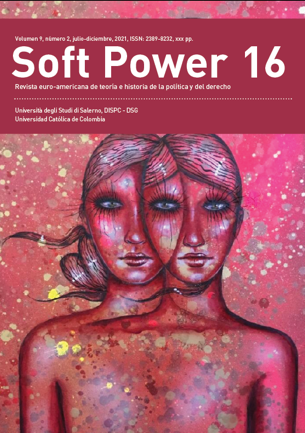
Este trabalho está licenciado sob uma licença Creative Commons Attribution-NonCommercial 4.0 International License.
Al enviar los artículos para su evaluación, los autores aceptan que transfieren los derechos de publicación a Soft Power. Revista Soft Power para su publicación en cualquier medio. Con el fin de aumentar su visibilidad, los documentos se envían a bases de datos y sistemas de indización, así mismo pueden ser consultados en la página web de la Revista.Resumo
From time immemorial, human civilizations have attempted to regulate the sexual through the family and reproduction, which give sex a meaning, many meanings, that it does not have in itself: the creation of stable relationships, material support, affectivity, the projection of life into the future. Therefore, claiming an integration that goes through the acquisition of marriage rights, lesbians and gays have not shown any originality, retracing the widely beaten path of a redemption of the sexual into a promise of love. In a heterocisexist imaginary that remains widely shared even where same-sex couples have obtained legal recognition, homosexual sex, sterile in itself, nevertheless remains a symbol of the sexual in its wild and senseless, unredeemed and unredeemable expression, as the gender expressions that do not conform to the binary standards of a male and a female defined by their mutual, exclusive, but not symmetrical, attraction.

Referências
Balocchi, M. (2019). Intersex: Antologia multidisciplinare, Pisa: ETS.
Beachy, R. & Berlin, G (2010). The Birthplace of a Modern Identity. The Journal of Modern
History, 82(4), 801-838, Chicago: University of Chicago Press.
Benadusi, L. (2005). Il nemico dell’uomo nuovo: L’omosessualità nell’esperimento totalitario
fascista, Milano: Feltrinelli.
Butler, J. (2006). Gender Trouble: Feminism and the Subversion of Identity, London:
Routledge.
Davis, A. (1981). Women, Race and Class, New York: Random House.
Eco, U. (2017). Il Fascismo eterno, Milano: La nave di Teseo.
Fanon, F. (1952). Peau noir masques blancs, Paris: Éditions du Seuil.
Freud, S. (1930). Das Unbehagen in der Kultur, Frankfurt am Main: Fischer Verlag.
Garbagnoli, S. & Prearo, M. (2018), La crociata “anti gender”: Dal Vaticano alle manif
pour tous, Torino: Kaplan.
Goretti G. & e Giartosio T. (2006). La città e l’isola: Omosessuali al confino nell’Italia
fascista, Roma: Donzelli.
Kilomba, G. (2008). Plantation memories: Episodes of everyday racism. Münster: Unrast.
Marcasciano, P. (2018). L’aurora delle trans cattive: Storia, sguardi e vissuti della mia generazione
transgender, Roma: Edizioni Alegre.
Prearo, M. (2020). L’ipotesi neocattolica: Politologia dei movimenti anti-gender, Milano:
Mimesis.






